Current Board of Directors
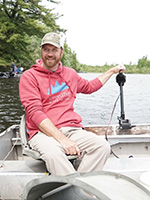 President (May 2025–May 2027) Steve Wolverton is a Professor in the Department of Geography and the Environment at the University of North Texas. His research focuses on historical ecology, zooarchaeology, and animal ecology in North and South America during the Holocene, emphasizing conservation, environmental justice, and heritage ethics. Steve has served as Treasurer and as editor of publications for the Society. Contact
President (May 2025–May 2027) Steve Wolverton is a Professor in the Department of Geography and the Environment at the University of North Texas. His research focuses on historical ecology, zooarchaeology, and animal ecology in North and South America during the Holocene, emphasizing conservation, environmental justice, and heritage ethics. Steve has served as Treasurer and as editor of publications for the Society. Contact
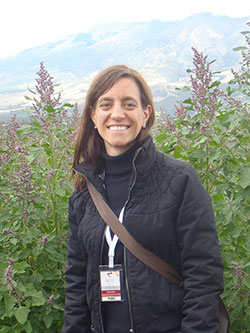 Vice President/President Elect (May 2025–May 2027) Maria Bruno was introduced to ethnobiology as an undergraduate Anthropology major at the University of Nevada, Reno (UNR) where she attended her first SOE Annual meeting in 1998. From Nevada, she went on to pursue graduate work in Andean archaeology and paleoethnobotany at Washington University in St. Louis. Her research has focused on the history and development of Indigenous agricultural practices in the Lake Titicaca Basin of Bolivia through ethnobotanical and paleoethnobotanical research. She recently (2024) published the book, Growing the Taraco Peninsula: Past and present indigenous agricultural landscapes of Lake Titicaca, Bolivia, with the University Press of Colorado. She was a faculty member in the Anthropology & Archaeology Department of Dickinson College from 2011 to 2022. She is currently adjunct faculty in the Anthropology Department at her alma mater, UNR, and is helping to host the 2025 SOE Annual Meeting at the Lake Tahoe campus. She has served as co-editor of Ethnobiology Letters since 2020.
Vice President/President Elect (May 2025–May 2027) Maria Bruno was introduced to ethnobiology as an undergraduate Anthropology major at the University of Nevada, Reno (UNR) where she attended her first SOE Annual meeting in 1998. From Nevada, she went on to pursue graduate work in Andean archaeology and paleoethnobotany at Washington University in St. Louis. Her research has focused on the history and development of Indigenous agricultural practices in the Lake Titicaca Basin of Bolivia through ethnobotanical and paleoethnobotanical research. She recently (2024) published the book, Growing the Taraco Peninsula: Past and present indigenous agricultural landscapes of Lake Titicaca, Bolivia, with the University Press of Colorado. She was a faculty member in the Anthropology & Archaeology Department of Dickinson College from 2011 to 2022. She is currently adjunct faculty in the Anthropology Department at her alma mater, UNR, and is helping to host the 2025 SOE Annual Meeting at the Lake Tahoe campus. She has served as co-editor of Ethnobiology Letters since 2020.
Maria views ethnobiology as an avenue to bring together diverse communities through shared interests and compassion for all beings that share this world. She hopes to continue efforts to broaden the society’s membership, publications, activities, and impact through engagement with Indigenous, professional, and avocational groups locally and internationally. Contact
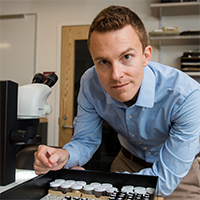 Treasurer (May 2023–May 2026) John M. Marston is Associate Professor of Anthropology and Director of the Archaeology Program at Boston University, where he heads the Environmental Archaeology Laboratory. A paleoethnobotanist, he studies the long-term sustainability of agriculture and land use with a focus on ancient societies of the Mediterranean and western and central Asia, including recent fieldwork in Turkey, Israel, and Uzbekistan, and pending fieldwork in Greece. His research has been recently supported by the National Science Foundation, National Geographic Society, and Australian-American Fulbright Commission, leading to numerous publications including the award-winning monograph Agricultural Sustainability and Environmental Change at Ancient Gordion and the article “Modeling Resilience and Sustainability in Ancient Agricultural Systems" in the Journal of Ethnobiology. A former co-editor of Ethnobiology Letters (2015–2020), he has been a member of the Society since 2007. His favorite grass is Stipa holosericea. Contact
Treasurer (May 2023–May 2026) John M. Marston is Associate Professor of Anthropology and Director of the Archaeology Program at Boston University, where he heads the Environmental Archaeology Laboratory. A paleoethnobotanist, he studies the long-term sustainability of agriculture and land use with a focus on ancient societies of the Mediterranean and western and central Asia, including recent fieldwork in Turkey, Israel, and Uzbekistan, and pending fieldwork in Greece. His research has been recently supported by the National Science Foundation, National Geographic Society, and Australian-American Fulbright Commission, leading to numerous publications including the award-winning monograph Agricultural Sustainability and Environmental Change at Ancient Gordion and the article “Modeling Resilience and Sustainability in Ancient Agricultural Systems" in the Journal of Ethnobiology. A former co-editor of Ethnobiology Letters (2015–2020), he has been a member of the Society since 2007. His favorite grass is Stipa holosericea. Contact
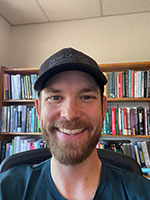 Treasurer-Elect (May 2025–May 2026) Jonathan Dombrosky is the environmental archaeologist at Crow Canyon Archaeological Center, located in southwestern Colorado. He uses large datasets to answer broad questions about past human-environment interaction in the central Mesa Verde region. Some of his other major projects have focused on Ancestral Pueblo fishing strategies in the Middle Rio Grande region of New Mexico during the late pre-Hispanic period. He has wide-ranging interests in human behavioral ecology, stable isotope ecology, 3D geometric morphometrics, radiocarbon chronology building, and conservation biology. Contact
Treasurer-Elect (May 2025–May 2026) Jonathan Dombrosky is the environmental archaeologist at Crow Canyon Archaeological Center, located in southwestern Colorado. He uses large datasets to answer broad questions about past human-environment interaction in the central Mesa Verde region. Some of his other major projects have focused on Ancestral Pueblo fishing strategies in the Middle Rio Grande region of New Mexico during the late pre-Hispanic period. He has wide-ranging interests in human behavioral ecology, stable isotope ecology, 3D geometric morphometrics, radiocarbon chronology building, and conservation biology. Contact
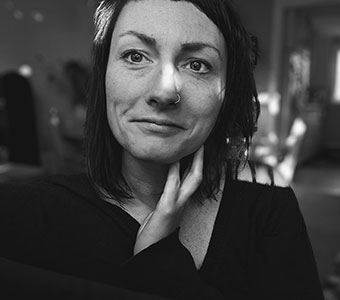 Secretary (May 2024–May 2027) Ashley Blazina is excited to hold the Secretary position on the Society of Ethnobiology's board! She loves the Society deeply, and is honored to serve SoE in this role. In her previous roles as the Awards Coordinator and Co-conference Coordinator, she gained a deep understanding of the ins and outs of the Society—this knowledge, she believes, is crucial to taking pertinent, yet thorough meeting minutes, as well as aptly directing any Society correspondence to the appropriate parties. She deeply appreciates being part of the meeting conversations where collaborations, successes, and challenges are shared, and is honored to organize the times and spaces where such amazing work is inspired or started for our Society. Contact
Secretary (May 2024–May 2027) Ashley Blazina is excited to hold the Secretary position on the Society of Ethnobiology's board! She loves the Society deeply, and is honored to serve SoE in this role. In her previous roles as the Awards Coordinator and Co-conference Coordinator, she gained a deep understanding of the ins and outs of the Society—this knowledge, she believes, is crucial to taking pertinent, yet thorough meeting minutes, as well as aptly directing any Society correspondence to the appropriate parties. She deeply appreciates being part of the meeting conversations where collaborations, successes, and challenges are shared, and is honored to organize the times and spaces where such amazing work is inspired or started for our Society. Contact
Board Members at Large
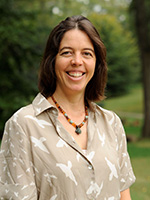 Publications Liaison (May 2023–May 2027) Professor Cynthia "Cissy" Fowler is Chair of the Department of Sociology and Anthropology at Wofford College. Fowler is a deeply devoted ethnobiologist and anthropologist who expresses her dedication to these disciplines through teaching undergraduates, performing service at her institution as well as in local and professional communities, editing academic publications, and research and writing. Fowler’s research interests are in the areas of biosocial dynamics and space-time cultures. Her current research lies at the intersections of anthropology, ecology and science and technology studies. She has conducted ethnographic fieldwork in Indonesia, Hawai‘i, Vietnam, the U.S. South, and Brazil. Fowler has published her research results in journal articles and books, including Biosocial Synchrony on Sumba: Multispecies Interactions and Environmental Variations in Indonesia (2016), Ignition Stories: Indigenous Fire Ecology in the Indo-Australian Monsoon Zone (2013), and Fire Otherwise: An Ethnobiology of Burning in a Changing World, co-edited with James R. Welch (2018). Fowler and Dr. Steven Wolverton are the co-editors of the Society of Ethnobiology’s monograph series, Contributions in Ethnobiology. Fowler is also the co-editor, alongside Dr. Elizabeth Olson and Dr. Janelle Baker, of the book series Global Change/Global Health published by the University of Arizona Press. Fowler has been an active member of the Society of Ethnobiology since 1999, serving as the President (2017–2019), and board member (2010–2017), co-founder and editor (2010–2015) of the open access journal Ethnobiology Letters, and the book review editor of the Journal of Ethnobiology. Contact
Publications Liaison (May 2023–May 2027) Professor Cynthia "Cissy" Fowler is Chair of the Department of Sociology and Anthropology at Wofford College. Fowler is a deeply devoted ethnobiologist and anthropologist who expresses her dedication to these disciplines through teaching undergraduates, performing service at her institution as well as in local and professional communities, editing academic publications, and research and writing. Fowler’s research interests are in the areas of biosocial dynamics and space-time cultures. Her current research lies at the intersections of anthropology, ecology and science and technology studies. She has conducted ethnographic fieldwork in Indonesia, Hawai‘i, Vietnam, the U.S. South, and Brazil. Fowler has published her research results in journal articles and books, including Biosocial Synchrony on Sumba: Multispecies Interactions and Environmental Variations in Indonesia (2016), Ignition Stories: Indigenous Fire Ecology in the Indo-Australian Monsoon Zone (2013), and Fire Otherwise: An Ethnobiology of Burning in a Changing World, co-edited with James R. Welch (2018). Fowler and Dr. Steven Wolverton are the co-editors of the Society of Ethnobiology’s monograph series, Contributions in Ethnobiology. Fowler is also the co-editor, alongside Dr. Elizabeth Olson and Dr. Janelle Baker, of the book series Global Change/Global Health published by the University of Arizona Press. Fowler has been an active member of the Society of Ethnobiology since 1999, serving as the President (2017–2019), and board member (2010–2017), co-founder and editor (2010–2015) of the open access journal Ethnobiology Letters, and the book review editor of the Journal of Ethnobiology. Contact
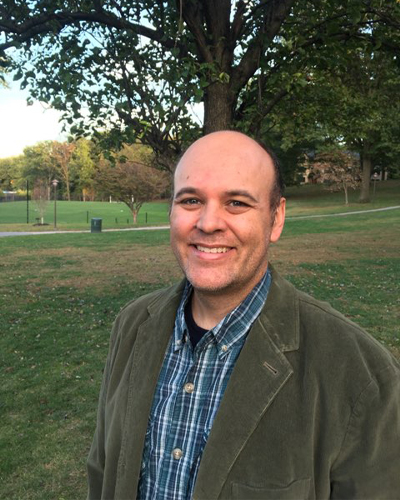 Promotion and Outreach Coordinator: Publicity and Community Engagement (May 2025–May 2028) Joshua Drew is an assistant professor of vertebrate conservation biology at the State University of New York's College of Environmental Science and Forestry (SUNY ESF) in Syracuse NY. During his career he has described six species of fish, worked on the evolution of marine biodiversity in the South Pacific and investigated shark toothed weapons of the I-Kiribati people. Now, as the director of the CHAOS (Coupled Human and Aquatic Organismal Systems) lab, he and his students use feminist approaches to identify strategies for aquatic conservation that center and support the rights and voices of local and Indigenous people and the waters they depend on. He is also a strong believer in outreach and making science accessible which has led him to present his research to a variety of audiences, including both US senators and drag queens, but he'll leave it up to you to decide which was more fun.
Promotion and Outreach Coordinator: Publicity and Community Engagement (May 2025–May 2028) Joshua Drew is an assistant professor of vertebrate conservation biology at the State University of New York's College of Environmental Science and Forestry (SUNY ESF) in Syracuse NY. During his career he has described six species of fish, worked on the evolution of marine biodiversity in the South Pacific and investigated shark toothed weapons of the I-Kiribati people. Now, as the director of the CHAOS (Coupled Human and Aquatic Organismal Systems) lab, he and his students use feminist approaches to identify strategies for aquatic conservation that center and support the rights and voices of local and Indigenous people and the waters they depend on. He is also a strong believer in outreach and making science accessible which has led him to present his research to a variety of audiences, including both US senators and drag queens, but he'll leave it up to you to decide which was more fun.
My first professional meeting ever was at the Society for Ethnobiology in Seattle in 2003 and I remember as a MS student not knowing anyone there, the feeling of welcoming and belonging that the society curated. Now that I've grown in my career, I want to ensure that we continue that legacy of warmth, inclusivity and welcoming to all members of our community. This position will allow us to engage with a larger group of people and hopefully foster honest and productive communications within our society and with our larger community. Contact
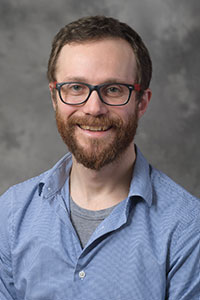 Promotion and Outreach Coordinator: Membership and Development (May 2024–2027) Andrew Flachs is an environmental anthropologist and ethnobiologist based at Purdue University. The Society of Ethnobiology is by far his favorite academic collective, because it provides a space to revel in the interconnections of living beings. His research in food and agriculture systems has taken him to explore communities of knowledge, resistance, solidarity, and joy across small farms and fermented foods in India, Eastern Europe, and the US.. Contact
Promotion and Outreach Coordinator: Membership and Development (May 2024–2027) Andrew Flachs is an environmental anthropologist and ethnobiologist based at Purdue University. The Society of Ethnobiology is by far his favorite academic collective, because it provides a space to revel in the interconnections of living beings. His research in food and agriculture systems has taken him to explore communities of knowledge, resistance, solidarity, and joy across small farms and fermented foods in India, Eastern Europe, and the US.. Contact
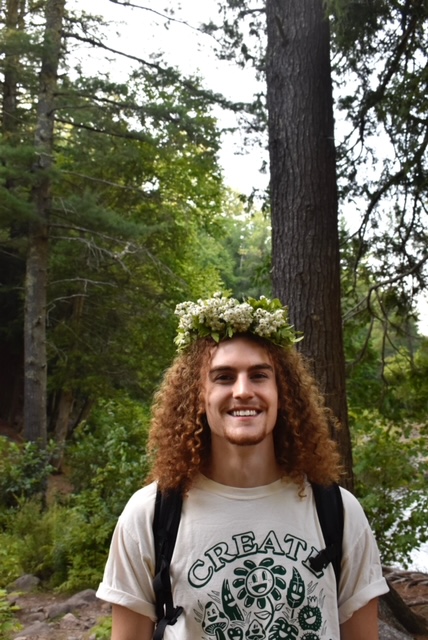 Web and Social Media Liaison (May 2023–May 2026) Ricky Rietjens is a senior at Northern Michigan University studying medicinal plant chemistry and indoor agriculture. His capstone research examines terpene synthesis of Cannabis sativa L. inflorescence in response to UVB addition and attenuation. Ricky’s love for plants, people, and culture can be seen through his interests outside of phytochemistry, which include ethnobotany, mycology, medical anthropology, pharmacognosy, phytoremediation, agricultural sciences, and sustainability. Ricky enjoys foraging for edible and medicinal plants and fungi native to Michigan's Upper Peninsula. Along with foraging for meals and herbal medicines, he spent his summer donating time at a local farm (Partridge Creek Farms) that provides free education and affordable produce to the Marquette County community in order to help combat food insecurity. Ricky plans to attend graduate school next year, and hopes to one day travel the world discovering and categorizing natural plant medicines, in addition to understanding their cultural use and medicinal efficacy. Contact
Web and Social Media Liaison (May 2023–May 2026) Ricky Rietjens is a senior at Northern Michigan University studying medicinal plant chemistry and indoor agriculture. His capstone research examines terpene synthesis of Cannabis sativa L. inflorescence in response to UVB addition and attenuation. Ricky’s love for plants, people, and culture can be seen through his interests outside of phytochemistry, which include ethnobotany, mycology, medical anthropology, pharmacognosy, phytoremediation, agricultural sciences, and sustainability. Ricky enjoys foraging for edible and medicinal plants and fungi native to Michigan's Upper Peninsula. Along with foraging for meals and herbal medicines, he spent his summer donating time at a local farm (Partridge Creek Farms) that provides free education and affordable produce to the Marquette County community in order to help combat food insecurity. Ricky plans to attend graduate school next year, and hopes to one day travel the world discovering and categorizing natural plant medicines, in addition to understanding their cultural use and medicinal efficacy. Contact
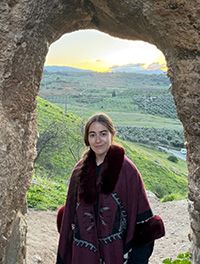 Undergraduate Ethnobiologist Award Winner (May 2025–May 2026) Sabrina Mata is a third-year student at Northern Michigan University, majoring in Medicinal Plant Chemistry and minoring in Spanish. Her academic journey represents a deep passion for the intersection of ethnobotany, medicine, biochemistry, organic chemistry, and analytical chemistry, focusing on exploring plants' medicinal properties. One of her primary independent research projects investigates the secondary metabolite profile of Datura ceratocaula, a semi-aquatic plant species known for producing tropane alkaloids. Sabrina's research involves isolating compounds from D. ceratocaula extracts and testing their antimicrobial activity. This work contributes to understanding the biochemical pathways underlying the plant's medicinal potential and offers insights into novel therapeutic applications. Sabrina attributes her fascination with ethnobotany to the half of her family from Mexico. After reconnecting with them a few years ago and learning that knowledge of herbal medicine is cherished and passed down through generations, she developed a profound respect for traditional healing practices. This ancestral wisdom provided the inspiration and foundational knowledge for her research, allowing her to bridge traditional practices with modern scientific inquiry in a way that honors both perspectives.
Undergraduate Ethnobiologist Award Winner (May 2025–May 2026) Sabrina Mata is a third-year student at Northern Michigan University, majoring in Medicinal Plant Chemistry and minoring in Spanish. Her academic journey represents a deep passion for the intersection of ethnobotany, medicine, biochemistry, organic chemistry, and analytical chemistry, focusing on exploring plants' medicinal properties. One of her primary independent research projects investigates the secondary metabolite profile of Datura ceratocaula, a semi-aquatic plant species known for producing tropane alkaloids. Sabrina's research involves isolating compounds from D. ceratocaula extracts and testing their antimicrobial activity. This work contributes to understanding the biochemical pathways underlying the plant's medicinal potential and offers insights into novel therapeutic applications. Sabrina attributes her fascination with ethnobotany to the half of her family from Mexico. After reconnecting with them a few years ago and learning that knowledge of herbal medicine is cherished and passed down through generations, she developed a profound respect for traditional healing practices. This ancestral wisdom provided the inspiration and foundational knowledge for her research, allowing her to bridge traditional practices with modern scientific inquiry in a way that honors both perspectives.
Appointed Board Positions
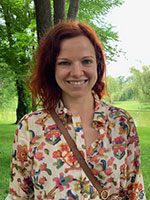 Awards and Graduate Fellowships Coordinator Kate Farley is a cultural anthropologist working at the Missouri Botanical Garden in St. Louis, Missouri. She holds a PhD in anthropology from Washington University in St. Louis and a MEM from Yale School of Forestry and Environmental Studies (now Yale School of the Environment). Kate is interested in community-based conservation and wild-harvested forest herbs. Most of her research has focused on the Appalachian region of the United States, but she is working on new projects in the Ozarks and in Madagascar. Kate is inspired by how truly interdisciplinary the Society is, and gets excited by opportunities to learn from ethnobotanical activists and elders and artists as well as scholars in other fields. In her free time, you can most likely find Kate practicing delicious "applied ethnobotany" in the kitchen, or in her craft room sewing wearable art. Contact
Awards and Graduate Fellowships Coordinator Kate Farley is a cultural anthropologist working at the Missouri Botanical Garden in St. Louis, Missouri. She holds a PhD in anthropology from Washington University in St. Louis and a MEM from Yale School of Forestry and Environmental Studies (now Yale School of the Environment). Kate is interested in community-based conservation and wild-harvested forest herbs. Most of her research has focused on the Appalachian region of the United States, but she is working on new projects in the Ozarks and in Madagascar. Kate is inspired by how truly interdisciplinary the Society is, and gets excited by opportunities to learn from ethnobotanical activists and elders and artists as well as scholars in other fields. In her free time, you can most likely find Kate practicing delicious "applied ethnobotany" in the kitchen, or in her craft room sewing wearable art. Contact
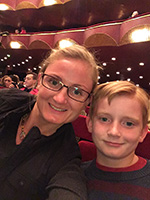 International Ambassador Dr. Liz Olson is an anthropologist by training and practice, and has spent more than two decades working with people and communities from many cultures to gain a genuine and deep understanding of what it means to be human. She earned her PhD from Case Western Reserve University with a focus on Medical Anthropology & Global Health. As a retired professor of anthropology (SUU, 2022) she is currently working as a consultant and researcher in user experience and human-centered design to help clients improve the ways that people use their products. Liz has been part of the Society for over a decade, and during that time has served in various roles on the Board of Directors. During her tenure as President, she worked to build greater inclusivity for the Society and ethnobiology, at large. Contact
International Ambassador Dr. Liz Olson is an anthropologist by training and practice, and has spent more than two decades working with people and communities from many cultures to gain a genuine and deep understanding of what it means to be human. She earned her PhD from Case Western Reserve University with a focus on Medical Anthropology & Global Health. As a retired professor of anthropology (SUU, 2022) she is currently working as a consultant and researcher in user experience and human-centered design to help clients improve the ways that people use their products. Liz has been part of the Society for over a decade, and during that time has served in various roles on the Board of Directors. During her tenure as President, she worked to build greater inclusivity for the Society and ethnobiology, at large. Contact
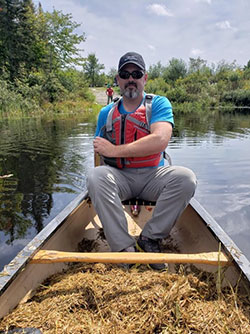 Indigenous Ambassador Scott M. Herron has been a professor of Biology at Ferris State University since 2002. He was also a visiting professor of Ethnobotany at the University of Michigan Biological Station, teaching an advanced ethnobotany field course from 2003–2015. Currently Scott is a Visiting Research Professor at the Matthaei Botanical Gardens and Nichols Arboretum at the University of Michigan where he mentors graduate students and collaborates in complex heritage food-based projects including wild rice and maize. Scott studied ecology, ethnobotany, cultural anthropology, paleoethnobotany, American Indian studies, and linguistics during his undergraduate and graduate careers. He continues his applied research as a specialist in the Great Lakes region, with focus on the Anishinaabek culture (Ojibwe, Ottawa, Potawatomi, Cree and Menominee). He directs the Wild Rice and Ethnobiology Lab at Ferris, is the faculty advisor for the FSU Mycology Club, Botany Club, and the Circle of Tribal Nations (inactive). Scott served as President of the Society of Ethnobiology, where for 4 years he oversaw 3 journals, an annual conference, 3 graduate fellowships, 1 undergraduate scholarship, and other awards. Scott has consulted with the US Forest Service and Cedar Tree Institute of Marquette on 7 years of workshops centered on native plants and native pollinators taking place in tribal communities across Michigan’s Upper Peninsula. Scott just concluded a 2-year NSF Grant titled “Build and Broaden Indigenous Agriculture and Food Sovereignty Symposium” with 3 other co-PIs from Michigan and Wisconsin hosting in-person on May 20–22, 2022 (Marquette/L’Anse) and virtually September 19-21, 2021. In Spring 2023 Scott created Herron Environmental Services LLC, a consulting firm that will provide botanical, mycological, and other environmental services to clients across Michigan.
Indigenous Ambassador Scott M. Herron has been a professor of Biology at Ferris State University since 2002. He was also a visiting professor of Ethnobotany at the University of Michigan Biological Station, teaching an advanced ethnobotany field course from 2003–2015. Currently Scott is a Visiting Research Professor at the Matthaei Botanical Gardens and Nichols Arboretum at the University of Michigan where he mentors graduate students and collaborates in complex heritage food-based projects including wild rice and maize. Scott studied ecology, ethnobotany, cultural anthropology, paleoethnobotany, American Indian studies, and linguistics during his undergraduate and graduate careers. He continues his applied research as a specialist in the Great Lakes region, with focus on the Anishinaabek culture (Ojibwe, Ottawa, Potawatomi, Cree and Menominee). He directs the Wild Rice and Ethnobiology Lab at Ferris, is the faculty advisor for the FSU Mycology Club, Botany Club, and the Circle of Tribal Nations (inactive). Scott served as President of the Society of Ethnobiology, where for 4 years he oversaw 3 journals, an annual conference, 3 graduate fellowships, 1 undergraduate scholarship, and other awards. Scott has consulted with the US Forest Service and Cedar Tree Institute of Marquette on 7 years of workshops centered on native plants and native pollinators taking place in tribal communities across Michigan’s Upper Peninsula. Scott just concluded a 2-year NSF Grant titled “Build and Broaden Indigenous Agriculture and Food Sovereignty Symposium” with 3 other co-PIs from Michigan and Wisconsin hosting in-person on May 20–22, 2022 (Marquette/L’Anse) and virtually September 19-21, 2021. In Spring 2023 Scott created Herron Environmental Services LLC, a consulting firm that will provide botanical, mycological, and other environmental services to clients across Michigan.
Scott lives in Big Rapids, Michigan with his family including Aden and Lucy Herron, whom he has integrated into the seasonal subsistence life activities that he has studied, and now practiced for most of his adult life. Scott actively makes maple sugar, harvests wild mushrooms, many berries, nuts, is a seasoned wild rice harvester/processor/instructor, and is active in fishing, biking, kayaking, canoeing, cross country skiing, hiking, bird watching and cleaning up the local natural areas of his community. He tends organic polyculture gardens, 2 cats and a dog (Oakey Sage), an extensive ethnobotanical home garden, and cooks both wild and domestic foods in creative ways. Contact
